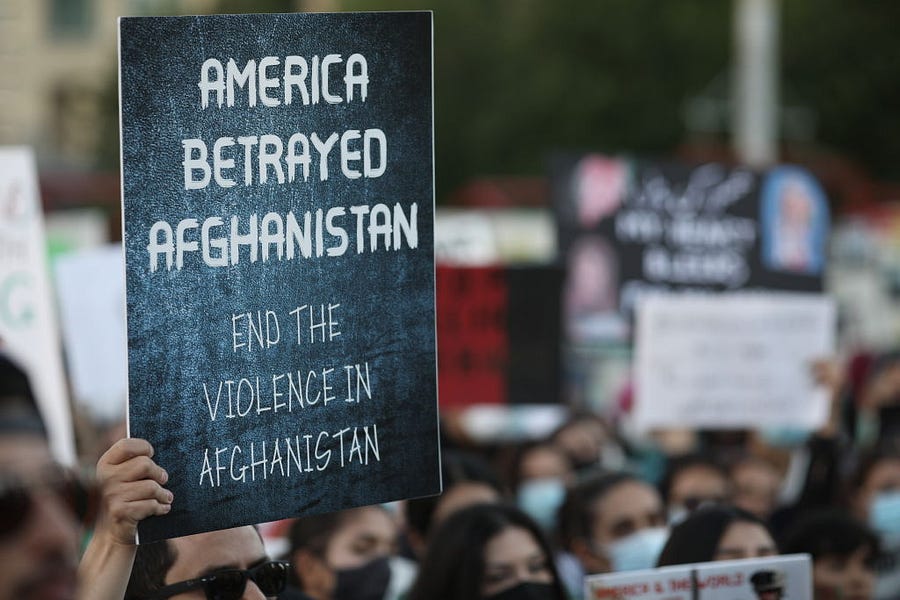One year ago today, Naheed Farid saw more than a decade of advocacy on behalf of Afghanistan’s women and girls collapse.
As a lawmaker in the lower house of Afghanistan’s national assembly for 11 years, Farid had worked to preserve and expand opportunities that she herself lived without during teenage years spent under Taliban rule. But on August 15, 2021, the same group that terrorized Farid’s adolescence swept Afghanistan’s capital city of Kabul after months of encircling and capturing provincial capitals across the country. The same day, which the Taliban have since declared a national public holiday, Afghan President Ashraf Ghani fled the country and the U.S. military began its ill-fated noncombatant military evacuation operation (NEO).
On August 26, with the U.S. full withdrawal date approaching, an Islamic State suicide bombing outside of Hamid Karzai International Airport left more than 160 Afghans and 13 U.S. service members dead and many more injured.
By month’s end, any Afghans remaining in-country—including U.S. partners, ethnic and religious minorities, and women and girls—fell under the Taliban’s extremist rule with few pathways of escape. An associate of Farid’s, a woman who previously worked for a U.S. contractor, is among them. The Taliban attacked her in her own home last month. She’s been in hiding ever since.
“Afghan women and girls now face a blatant gender apartheid,” Farid said in an interview. “The Taliban have stripped most women of the right to work and education. Young women who grew up in a free and open society are now living in fear.”
The reality now facing Afghanistan’s women is one the State Department sought to avoid by putting economic and diplomatic pressure on the Taliban to form an inclusive government. But the insurgent group, despite promising to work “shoulder-to-shoulder” with women, never deviated from the same extremist interpretation of Islam it followed more than 20 years ago. Shortly after taking power last year, the Taliban formed an all-male and hardline government, which has since barred girls from attending secondary school—a ban nearing its 11-month mark—and pressured many workplaces into dismissing their female employees.
In a May 2022 report, the special inspector general for Afghanistan reconstruction (SIGAR) identified the U.S.’s withdrawal as the “single most important factor” in the Afghan security forces’ collapse and the Taliban’s subsequent takeover. As the U.S. looks back on the year that’s followed, Congress, the Pentagon, the State Department, and the White House have competing assessments of who’s at fault and lessons learned.
Among other areas of focus, congressional Republicans continue to emphasize the extent to which President Joe Biden ignored recommendations from the country’s top generals in the lead-up to the withdrawal—a reality that became clear just days after Kabul fell.
Asked by ABC News host George Stephanopoulos on August 19, 2021, whether any of his military advisers had recommended that he keep a residual force of 2,500 troops on the ground in Afghanistan, Biden denied having received such advice: “No. No one said that to me that I can recall.”
But Gen. Mark Milley, chair of the Joint Chiefs of Staff, and Gen. Frank McKenzie, the commander of U.S. Central Command, challenged that assertion weeks later when they testified under oath that they urged Biden against withdrawing all American troops from Afghanistan.
“What can be learned from this is that the president should always listen to the people around him,” Sen. Jim Risch, the ranking Republican on the Senate Foreign Relations Committee, told The Dispatch.
It’s the kind of congressional testimony that Republicans will likely continue to seek if they retake the majority in the House this fall. “We knew what not to do before we did it,” Rep. Mike Rogers, the ranking Republican on the House Armed Services Committee, said in an interview last month.
Rogers maintains that even some of his Democratic colleagues on the committee urged the White House against following through with a full drawdown of troops. “Both sides of the aisle on the [House] Armed Services committee were telling the administration not to do what we did the way that we did it, and the State Department wouldn’t listen,” Rogers said. “That’s the first thing we learned—don’t let the State Department run a military operation. They can screw up a steel ball with a rubber hammer.”
In February 2020, the Trump administration finalized an agreement with the Taliban to reduce U.S. forces effectively to zero. Some lawmakers say that the Biden team’s decision to adhere to this agreement—despite clear evidence that the Taliban hadn’t adhered to six of the seven conditions outlined in the agreement, including one requiring that it relinquish ties to al-Qaeda—placed diplomatic priorities ahead of national security interests. The fact that al-Qaeda leader Ayman al-Zawahiri was in Kabul when a U.S. operation killed him this month demonstrates the growing terrorism threat emanating from Taliban-controlled Afghanistan.
“Al-Zawahiri’s death should serve as a reminder of the constant vigilance peace demands. Al-Qaeda remains a dangerous enemy. The Taliban never broke with al-Qaeda,” GOP Rep. Liz Cheney said in a recent statement. “And the Taliban’s Afghanistan remains a safehaven for terrorists to this day.”
The administration has boasted that the strike is a success in the military’s over-the-horizon strategy. But without a troop presence on the ground in Afghanistan or a nearby military base, the U.S. continues to face a host of obstacles—both tactical and political—as it seeks to conduct counterterrorism operations from afar.
“They can operate freely, they can regroup, reorganize. And there’s a real threat that it will get worse, endangering the region and the world,” Farid explained. “The biggest challenge in the aftermath of the U.S. withdrawal from Afghanistan is accessing real-time information, confirming counterterrorism targets on the ground … Without any foothold, without anyone on the ground, it’s impossible.”
In addition to the persistent security threats posed by the U.S. pullout, the plight of Afghanistan’s women and stranded U.S. allies also weighs on congressional Democrats. Many are focusing on aiding the escape efforts of at-risk allies still on the ground.
“Our failure to enable their exit will continue to be a real potential stain on our national character,” Democratic Sen. Richard Blumenthal of Connecticut, who sits on the Senate Committees on Armed Services and Veterans’ Affairs, said in an interview earlier this month.
Blumenthal said that the U.S. government is still in communication with organizations—veterans’ groups in particular—helping “at-risk Afghan allies who still have targets on their backs” get out of the country. He’s one of six senators of both parties who unveiled last week a new bill called the Afghan Adjustment Act, which aims to help special immigrant visa-eligible Afghans abroad immigrate to the United States. For Afghan refugees already in the country, the legislation would create additional legal pathways to permanent citizenship.
More than 75,000 Afghan nationals have been resettled in the United States since the summer of 2021. “The United States will continue welcoming additional qualifying Afghans over the coming weeks and months,” a State Department spokesperson told The Dispatch. But many of the U.S.’s Afghan allies and their families still remain stranded in Afghanistan, where the Taliban has systematically targeted former U.S. employees and Afghan government officials and military personnel for harassment, imprisonment, and execution—despite promises of political amnesty.
A report by House GOP investigators obtained by Politico on Sunday sheds new light on the number of at-risk Afghans left behind: “In May, there were 17,000 principle SIV-eligible applicants in Afghanistan who were in the pipeline, and when dependents were included, the number would be substantially higher. Beyond those who had applied, neither State nor the Department of Defense (DoD) could even estimate how many Afghans were eligible for the program. As we now know from additional applicants, this number is in the tens of thousands.”
“There’s still a lot of our former allies … in Afghanistan. We’re going to continue to try to get them out,” Rep. Ruben Gallego, a Democrat on the Armed Services Committee, told The Dispatch. “I’m certainly going to be reaching out to the families that I helped get out of Afghanistan. I think the lessons we need to learn are that these types of operations take time, and that when we offer people this type of safe passage that we have to make sure that we fully implement it.”
At least 800 American citizens were also left behind and have since been evacuated, per the House GOP report. The administration’s failure to get U.S. nationals out of Afghanistan before the full military withdrawal has been a major critique from Biden’s political opponents and one-time supporters alike. According to FiveThirtyEight polling data, Biden’s approval and disapproval ratings first crisscrossed in August 2021, days after Kabul fell to the Taliban. The president’s favorability among voters has fallen since.
“After the mess—to put it nicely—of the withdrawal from Afghanistan, many of the American people lost confidence in Joe Biden as a leader and once you lose that, it’s hard hard to get that back,” former Democratic Rep. Dan Lipinski, a member of the Blue Dog Coalition, said in an interview with The Dispatch.
Lipinski said that the American public responded to the Biden administration’s withdrawal from Afghanistan in a similar way as it did to its handling of the baby formula shortage—with frustration and confusion as to how senior officials were so unprepared for the fallout.
“There’s an expectation of a level of competency, I think, that is higher, perhaps for the Biden administration than it was for the Trump administration—just a competency of getting things done and not screwing things up,” Lipinski said. “There didn’t really seem to be any accountability for what happened in either of those cases.”
Should they retake the lower chamber next year, House Republicans plan to incorporate Afghanistan into their Biden administration oversight strategy—along with similar investigative efforts into Hunter Biden’s business dealings, the FBI’s Mar-a-Lago search, and the origins of COVID-19.
“When we take over next year, we’re going to do a review that the Democrats won’t do because they don’t want to embarrass the Biden administration,” Rogers said in reference to the Afghanistan withdrawal. “There’s no way they’d come out looking good.”
Prioritizing political optics over strategy may be what led to last year’s foreign policy failure in the first place, Republican lawmakers say. Americans’ general support of an Afghanistan exit may have contributed to the White House’s sense of urgency to depart Afghanistan as quickly as possible, even if such a decision ran counter to recommendations from Biden’s military advisors.
“Most people in America wanted to get out of Afghanistan. Nobody wanted to go out that way,” Sen. Risch said. “That withdrawal was an embarrassment for the United States, it hurt our image with both friends and enemies, and it’s going to take a long time to recover from that.”
But as American attention to Afghanistan wanes, Afghans under Taliban rule and refugees abroad hope the one-year anniversary of Kabul’s fall can serve as a reminder of what’s at stake.
“We need a country that is free, a country that is democratic. I committed my life to build it, and so many other Afghan women and men also committed their lives to build that kind of country,” Farid said. “To reclaim this dream that the Taliban took away from us—the democracy, the freedom, the beauty of our country—we need a lot of solidarity.”
Price St. Clair contributed to this report.








Please note that we at The Dispatch hold ourselves, our work, and our commenters to a higher standard than other places on the internet. We welcome comments that foster genuine debate or discussion—including comments critical of us or our work—but responses that include ad hominem attacks on fellow Dispatch members or are intended to stoke fear and anger may be moderated.
With your membership, you only have the ability to comment on The Morning Dispatch articles. Consider upgrading to join the conversation everywhere.